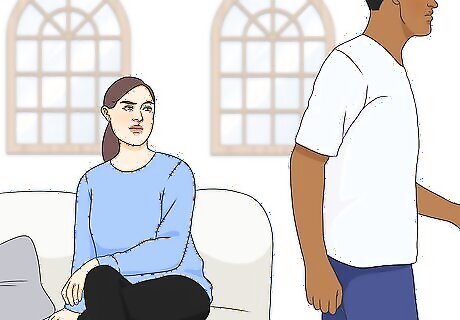
views
- It’s possible your husband might genuinely hold some resentment toward you if he feels neglected or like you’re overly negative and critical of him.
- Alternatively, your husband might simply be stressed about something else and is taking out his negative emotions on you, even though you’re not the problem.
- Figure out what’s wrong by sitting down and talking honestly with your husband. Ask him directly if there’s something wrong and what you can do to fix things.
Reasons Your Husband Is Acting Like He Hates You

He may be stressed or upset and taking it out on you. It’s possible that your husband doesn’t have any negative feelings toward you at all; rather, something else in his life is causing him to seem more angry, frustrated, or distant than usual. He might be going through a hard time at work, dealing with family issues, or troubled by some other issue. If this is the case, your husband may not even realize his troubles (and reaction to them) are taking a toll on the marriage.

He may feel neglected. Have you been really busy lately and haven’t spent as much quality time with your husband as usual? Your husband may be upset because he feels like he isn’t a priority for you anymore. Lack of attention, intimacy, sex, or affection may be causing him to develop those feelings of neglect. For example, if you’re always forgetting to call him or text him back on busy days or repeatedly cancel date nights with no warning, he might feel like he’s not as important as the other things in your life.

He may feel like there’s not enough compromise in the marriage. Compromise (finding a middle ground between two different ideas) is crucial to any relationship. When a couple disagrees, compromise can help them reach a solution they both agree on. If disagreements end with you getting your way (without any compromise), your husband might feel like you’re being selfish or uncooperative. For example, he might feel like he’s done all the work when it comes to household chores or managing joint finances and wish your marriage had a healthy balance of give and take instead.

He may feel like you nag or criticize him too much. Things like nagging or criticism can create negativity in the relationship, even when your intentions are pure. Though you may just be trying to help, your husband may end up feeling attacked over critical comments. Over time, if more negative interactions start occurring than positive ones, it can lead to anger, frustration, and confusion for both spouses. According to a study from psychologist John Gottman, relationships need more positive interactions than negative ones to really thrive. The “magic ratio” is 5:1, meaning for every negative interaction, there should be at least 5 positive ones. Even if you’ve accidentally let some negativity slip into the marriage lately, it’s still possible to turn things around, so long as your husband tells you honestly what the problem is and you’re willing to figure things out with him.

He may resent you because of an extramarital affair. If he knows or suspects that you’ve been unfaithful to him, your husband may seem to hate you because he’s holding onto anger and resentment over the perceived affair. Keep in mind that, even if you’re not trying to hurt him, there are a lot of ways to be unfaithful—from full-blown physical cheating to an emotional affair that only takes place in texts or online. For example, flirting with a colleague over text or making an emotional connection with another guy on social media online would count as an emotional affair, even if it’s not physically cheating.

He may want to end the marriage, but he doesn't know how. Your husband may try to distance himself from you if he’s already decided that his heart isn’t in the marriage anymore but can’t figure out how to pull the plug himself. He may act spiteful, angry, or resentful around you because he wants you to step up and end things instead. That’s unfair to you; you deserve a spouse who’s honest about their feelings, even if there’s a problem.
Signs Your Husband May Hate You

He fights with you all the time. Conflict is a normal part of all marriages (and relationships in general), but if it feels like your husband picks a fight over every little thing all of a sudden, there might be something more going on. Constant fights can be a major sign of resentment in a marriage. It may even seem like he looks for issues where there aren’t any and blames you for every single problem (rather than taking some responsibility himself). Alternatively, instead of fighting, he may resort to stonewalling—which essentially means refusing to engage at all and walking away instead, making communication extremely difficult.

He’s not putting any effort into the marriage anymore. Does it feel like your husband doesn’t even care if the marriage works or not? Has he stopped making the effort to connect with you emotionally, make you happy, and share his thoughts and feelings with you? If he stops putting effort into your relationship, it could mean he’s struggling with some resentment. This is especially common if your husband is feeling neglected himself—if he feels like you’re not making an effort, he might stop making an effort too. It may feel like you and your husband are just going through the motions or that you’re more like roommates who don’t really communicate with one another rather than spouses.

He never shows affection or engages in physical intimacy. Does it feel like the physical connection between you has all but disappeared? Most marriages rely on physical intimacy from both partners—which includes not only sex but things like kisses, hugs, hand-holding, and other affectionate gestures. If your husband doesn’t engage in physical intimacy anymore, it may be a sign that his feelings toward you have changed.

You regularly feel unappreciated. Gratitude is important for partners—without it, you may start to feel taken for granted. If your husband resents or even hates you, he may not show appreciation for all the little (and big) things you do for him every day to make him happy or make his life a little easier. For example, if he has no reaction when you make him breakfast in bed as a treat or doesn’t thank you when you do one of his chores for him, it might make you feel quite unappreciated.

He’s been unfaithful to you. If your husband resents you, he might decide to be unfaithful and have an affair with someone else. Generally, people satisfied in their relationships tend to view infidelity negatively—so if your husband is open to infidelity, it’s a strong sign there’s something wrong (for him, at least).

He rarely spends time with you. Though married couples aren’t necessarily joined at the hip, they typically spend more time with one another than anyone else. Think about how much time you spend with your husband; if he’s always coming up with excuses to leave the house (or avoid coming home) and doesn’t have any time for you, it may be a sign that he doesn’t want to spend time with you anymore. For example, he might suddenly start working late every night or tell you he has to work weekends (without coming up with another way for the two of you to have quality time together in between all that work). In fact, it’ll likely feel like it’s not involved with your life at all anymore. You might barely see him most of the time, to the point that it may feel like you’re living totally separate lives altogether.

He doesn’t remember important dates. Does he forget your birthday? Forget to get you a Valentine’s Day gift or a card for your anniversary? Mistakes happen to every couple, but if your husband repeatedly misses most of the dates that are significant to your marriage and doesn’t seem at all regretful or apologetic about it, it might be a sign there’s something more going on.

He doesn’t seem to miss you when you’re apart. How does your husband react after being apart from you for a significant chunk of time? Does he seem overjoyed to see you again, or totally apathetic? One sign of hatred is not missing someone when they aren't around and feeling indifferent (or even irritated) upon seeing them again. For example, if you tried to give your husband a “Welcome home!” hug after a week-long trip, and he just said “Not now” and walked away from you, it might be a sign he didn’t really miss you while he was gone.

He may become violent or abusive towards you. Verbal abuse can include emotional attacks like insults, name-calling, and put-downs—and, in some cases, that could escalate into physical (or violent) abuse. Abuse is not something that occurs in loving marriages; if your husband is abusive, it’s a strong sign of hatred as well. Remember: abuse of any kind is never okay under any circumstances. No matter what problems your husband may have with the marriage, it does not justify abusive behavior on his part.
What to Do If Your Husband Hates You

Sit down and have an open, honest conversation with him. If your husband is having problems with you and the marriage, it’s important to hear his side of the story. Talk to him and ask about his recent behavior; if you’ve noticed any of the signs above, ask about them to figure out what he’s feeling and why he feels that way. Keep an open mind, and let him explain the cause of his behavior. Communication is the key to fixing things between you! For example, you might say something like, “I’ve noticed a lot of arguments lately, and that you haven’t been home as much, and I was wondering if we could talk about what’s been happening.” Listen actively to his responses and try to be as understanding as possible. The goal here isn't to defend yourself or fix everything right away; it's to understand the situation so you can figure out how to proceed.

Reflect on your own behavior and make positive changes. Once you’ve heard from your husband, do some introspection on your own. Have you been doing anything that might have alienated your husband? Has your behavior changed recently, and do you think there’s anything you could be doing better? Figure out what you want to change, and take steps to adjust your behavior—both around your husband and in general. For example, you might think about it and realize you’ve been less affectionate lately and, in response, you might find ways to regularly show your husband verbal and physical affection (like compliments, praise, hugs, and kisses).

Start over with him if you feel like the marriage can be saved. So long as both you and your husband are ready and committed to building a stronger relationship together moving forward, the best thing for you to do is agree to start fresh. Talk to your husband once more and make an agreement to put the past behind you both, and make a plan to help you fall in love again. For example, taking one another out on romantic dates (even though you’re already married) may help reignite the spark in your marriage. Try new things together! Reintroduce adventure and excitement to your life together by visiting new places you've always wanted to see or taking a class you're both interested in. Get into one another's interests. Try doing something your husband loves, like watching a particular TV show, trying a sport, learning to draw, and so on—and, in return, show him an activity you love as well. Above all, be honest and open with one another no matter what.

Get relationship help from a marriage counselor. It’s okay if you and your husband need a little extra help to get your marriage to a better place. See a therapist together—one that specializes in counseling married couples and helping them work through relationship issues. Your therapist may help you and your husband communicate better and resolve underlying issues that might be making it harder for you to reconcile. If your husband refuses to get counseling with you (and still acts like he hates you), it might be time to decide whether or not your marriage can be saved. It’s hard to work through rough patches when one of you is trying, and the other isn’t.

Protect yourself first and foremost if he becomes abusive. Agreeing to start fresh and work on the marriage makes sense if you both still care for one another, but you shouldn’t have to live with an abusive husband—period. If he’s emotionally or physically abusive, it may be time to consider leaving him for good, and whatever you decide to do, protect yourself by seeking outside support and, if necessary, coming up with an escape plan. There are plenty of resources to use when dealing with an abusive spouse. Call the National Domestic Violence Hotline for support, and take advantage of the organization’s guide to safety planning.


















Comments
0 comment